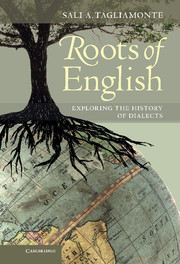Book contents
- Frontmatter
- Contents
- List of Figures
- List of Tables
- Preface
- Acknowledgements
- Abbreviations
- 1 Introduction
- 2 Dialects as a window on the past
- 3 The Roots Archive
- 4 Methods of analysis
- 5 Word endings
- 6 Joining sentences
- 7 Time, necessity and possession
- 8 Expressions
- 9 Comparative sociolinguistics
- 10 The legacy of British and Irish dialects
- Notes
- References
- Index
7 - Time, necessity and possession
Published online by Cambridge University Press: 05 November 2012
- Frontmatter
- Contents
- List of Figures
- List of Tables
- Preface
- Acknowledgements
- Abbreviations
- 1 Introduction
- 2 Dialects as a window on the past
- 3 The Roots Archive
- 4 Methods of analysis
- 5 Word endings
- 6 Joining sentences
- 7 Time, necessity and possession
- 8 Expressions
- 9 Comparative sociolinguistics
- 10 The legacy of British and Irish dialects
- Notes
- References
- Index
Summary
I suppose everybody else has their own dialect so we’ve got our own little dialect so.
(Barry Brandon, DUR, 010)In this chapter I examine a number of features that involve the way people talk about time (i.e. tense), modality (i.e. ability, permission and obligation) and aspect (i.e. the manner of an action). The tense/modal/aspect system of English has changed dramatically over the past several hundred years. I will focus on three areas. Each one has been involved in extensive variation and change. The first involves changes in the future temporal reference system as the older forms shall and will give way to a newer construction with going to. The second involves reorganization of the modal system, in particular the expression of obligation/necessity. In this case an old modal, must, is fading away as two other forms, i.e. have to and have got to, compete for this meaning. The third involves transformations in the forms used to express stative possession, i.e. ownership and personal attributes. Where once have was the only variant, over the past several hundred years have got has encroached on its territory. Examination of these systems of grammar in the Roots Archive may reveal earlier stages in the development of these areas of grammar. In turn, this may provide a window on how grammars evolve.
The future
The future is an ideal choice for cross-community analysis in the context of ongoing change. Its major variants, going to and will (often ’ll), as in (1), are widely used and shared by most, if not all, varieties of English. Although people sometimes think there is a meaning difference between these forms, in running conversation they are often interchangeable, as in the examples in (1).
- Type
- Chapter
- Information
- Roots of EnglishExploring the History of Dialects, pp. 121 - 160Publisher: Cambridge University PressPrint publication year: 2012



